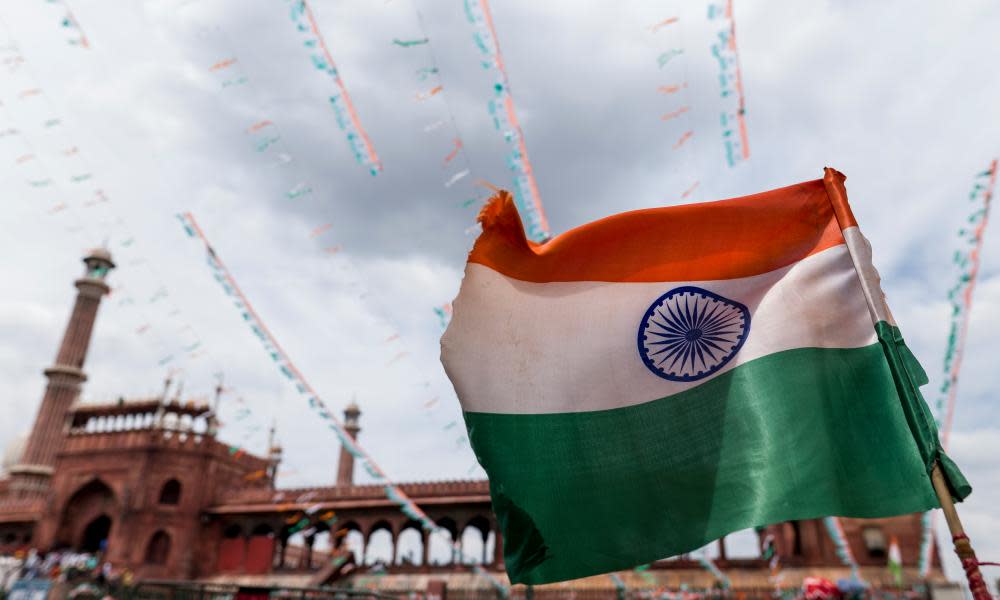Salman Rushdie’s grave fears for Indian democracy published in PEN anthology

Salman Rushdie signed a letter expressing “grave concerns about the rapidly worsening situation for human rights in India” and contributed a short piece to a collection about India at 75 before he was stabbed on stage at an event in New York.
The writer was one of 102 signatories to the PEN America letter to Droupadi Murmu, who has served as India’s president since July. The letter, dated 14 August, was sent to coincide with the 75th anniversary on 15 August of India’s independence from British rule.
The letter says: “We write to express our grave concern regarding the myriad threats to free expression and other core rights that have been building steadily in recent years, since the Bharatiya Janata party-led government has come to power.
“We urge you to support the democratic ideals promoting and protecting free expression in the spirit of India’s independence, and restore India’s reputation as an inclusive, secular, multi-ethnic and -religious democracy where writers can express dissenting or critical views without threat of detention, investigation, physical attacks or retaliation.”
Other writers who signed the letter include Ayad Akhtar, Kiran Desai, JM Coetzee, Elif Shafak, Colm Tóibín and Anne Tyler.
Rushdie, who was born in India, remains in hospital after Friday’s attack at a literary festival, but has been removed from a ventilator. The man suspected of attacking him, Hadi Matar, pleaded not guilty at the weekend to charges of attempted murder and assault at a brief court appearance where he was denied bail.
In addition to signing the letter, Rushdie also contributed to PEN America’s India at 75, a collection of short writings by authors from India and the Indian diaspora. The collection asked writers to express what they felt in response to “an acceleration of threats against free speech, academic freedom and digital rights, and an uptick in online trolling and harassment” since the 2014 Indian election.
The collection records “ideas of what India was and ought to be, and what it has become”.
Rushdie’s contribution was written before the attack on him, said PEN America.
In the short piece, Rushdie reflects on the collective history of “Hindustan Humara”, translated as “our India”, when “we celebrated one another’s festivals, and believed, or almost believed, that all of the land’s multifariousness belonged to all of us”.
But, he goes on to write, that “dream of fellowship and liberty is dead, or close to death” and, calling on imagery from JRR Tolkien’s The Lord of the Rings, “the Ruling Ring – one might say –has been forged in the fire of an Indian Mount Doom”.
Other writers in the India at 75 collection include Angela Saini, Hari Kunzru and Preti Taneja.
***

Salman Rushdie
Then, in the First Age of Hindustan Hamara, our India, we celebrated one another’s festivals, and believed, or almost believed, that all of the land’s multifariousness belonged to all of us. Now that dream of fellowship and liberty is dead, or close to death. A shadow lies upon the country we loved so deeply. Hindustan isn’t hamara any more. The Ruling Ring – one might say – has been forged in the fire of an Indian Mount Doom. Can any new fellowship be created to stand against it?
Salman Rushdie was born in Bombay and lives in New York. He is the author of 20 books, including Midnight’s Children. His many international honours include the Booker Prize, the Best of Booker Prize, Companion of honor (UK), PEN Pinter prize, PEN/Allen lifetime achievement award (US), and EU’s Aristeion prize, among others.
***
Jhumpa Lahiri
Because I was born and raised outside of India, India, in its absence, took on even greater significance in my mind. I grew up with parents who, in missing India, sought out other Indians, and so my notion of an Indian community was always diverse. When they invited other Indian families to our home, in the small Rhode Island town where I was raised, I realised that India was an elastic container of individuals who spoke, ate, dressed, and prayed in different ways. These differences did not “enrich” an otherwise homogeneous India; they were India. In that sense, India seemed light years ahead of the United States, which was a melting pot in name but alienating and provincial in practice, at least from my perspective. Visits to Kolkata, a city that, as my mother liked to point out, welcomed all of India’s populations, only confirmed my perception that India’s relationship with the Other was built into its very fabric. The plurilingual aspect of India, in particular, both inspired and consoled me, for it insisted on the need for ongoing communication and translation. The co-existence of more than one language generates curiosity, calls for interpretation, and subverts any notion of absolute power. Unravel certain threads, or snip some strands away, and the conversation is lost; we are left with a frayed society, with imposed silence, with banal and baleful notions of nationhood.
Jhumpa Lahiri was born in London and grew up in the US to Bengali parents. She won the Pulitzer prize for her debut short story collection, Interpreter of Maladies, and is the author of three novels, including, most recently, Whereabouts, and two collections of short stories. She writes in English and Italian.
***
Geetanjali Shree
Earthworms in Masks
The time was my childhood. Till recently it did not feel so very long ago, but, suddenly now, it does. Not because I have come a long way but because I feel I might be near the end!
In that childhood would come a rare sound, a whirring, in the skies, in those days quite blue still. We would rush outdoors and look up. A machine with wings, flying far far above, flying far far away. To lands remote. To lands longed for. To lands never to be reached.
Hawaijahaz hawaijahaz, we children would shout.
It was no whirring. It was stirring of our dreams and longings.
Today. A whirr in the skies. The whirring as rare as in my childhood. The skies as blue. I don’t rush out but go with some weariness to the window, or to the balcony, my access to the outside during lockdown. I look up, a wee bit sadly, longing somewhat still, but dreams feeling a bit quashed. It is the same machine with wings, flying far far above, flying far far away, to places which had all come in my reach, but, may have gone out of my reach forever and ever.
There was magic when the horizon was far. Possibilities were the stuff of dreams.
But man was fast and confident and driven. He forged ahead. Became too fast, overconfident, ruthlessly ambitious.
The collateral effects were to my pleasure. I got on to planes and crossed the horizon. I wandered in unknown lands. Dreams became reality.
Everything became possible. Everything opened up. Everything lay under me. The trees of my childhood which gave shade to my house were now trees over which my house in a multistorey towered.
Man, the master of all, friend to none.
In the market. In global competition. In barrier-crossing. In the country, in the countryside, in the centre, in the margins, in the skies and the waters and ready to be so in space too.
We shook up everything and felt good about it. I did too as I am the collateral beneficiary of this glittery, overhyped, overactive world. Ever increasing our pace.
But shaking up everything meant Everything moved.
That Everything was alive. We were not making an inanimate world move. We were shaking up the Animate. Earth. Air. Water. Planets. Mountains. Worms.
Warnings came. Everything is shaking and us too with it and it will speed up. Speed thrills but also kills. But we believed in our immortality.
It struck. The virus.
In a flood a scorpion climbed up a swimmer’s shoulder and was being safely ferried across. Midway it stung its saviour, the very being saving it. But the scorpion was innocent. Stinging was its Dharma.
So too the virus. It was merely fulfilling its Dharma to leap borders and infect bodies.
Innocent.
But man? His Dharma?
And what of me, willy-nilly part of that erring man?
How now and how much to slow down after getting addicted to speed? After flying galore, rending apart the atmosphere, how, and how much, to fold up my wings?
The world had to run at our behest. We were not going to be dictated by a virus. We planned on gagging others, not ourselves.
So are we the aliens and robots we thought we will make of you and control? Hey you, in front of me, behind that mask and in that three piece protective suit, are you human? Am I? No smile. No hug, kiss, touch, love!
Move over humans, for the aliens and the Robots are upon us and are we them!
I was sure I will escape even if you can’t!
There was this earthworm which raised its head from the mud and stared at the disaster all around. He saw another earthworm doing the same. And said to the other – you stay stuck here, I am leaving for happier pastures.
At which the second earthworm replied – idiot, we are linked, I am your other end! Where I stay there you do too, where you go there go I. But where is there to go?
Here, he said, as if resolving anything, take this mask!
So – no place to go and anyway planes are not flying and when they do it is not safe and us a bunch of earthworms, some heads, some tails, all in the same mess of overkill and overreach. In masks.
That was then. Indeed planes are flying again and there we are flying in them as jubilantly as before. No slowing down, no reflecting on lessons to be learned, improving the world, we confidently believe again.
Gandhi was not such a madman after all!
Geetanjali Shree lives in Delhi and writes in Hindi. She wrote this piece in Hindi and translated it. She is the author of five novels, including Ret Samadhi (Tomb of Sand, translated by Daisy Rockwell) which won the International Booker prize in 2022. She has also written five collections of short stories. She is one of the founding members of a theatre group, Vivadi.


